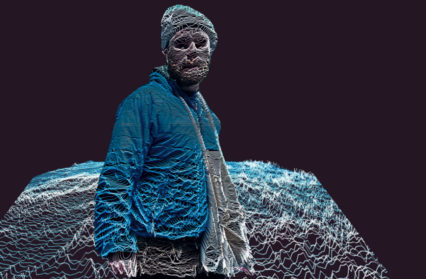On the tricentennial year of the publication of Robinson Crusoe, Give it a Name draw inspiration from Daniel Defoe’s classic in their production – Robinson: The Other Island. Thomas Tyrrell reviews.

There are not many works of literature whose 300th anniversary could be marked by a Guardian editorial calling for it to be cast out of the canon of English Literature. The DNA of Robinson Crusoe is visible in everything from Lord of the Flies to Lost to The Martian, but beyond its culturally familiar core elements, the original still has the power to shock. On graduating from the Ladybird version to my first abridged edition, I was terrified by Crusoe’s dream of the burning man who comes down from the clouds and tells him to repent, or he shall surely die.
Now I marvel how, despite re-reading it for a university course in 2012, I let Robinson Crusoe’s pre-shipwreck career as a slave trader slip comfortably out of my memory.
Give it a Name’s new production of Robinson: The Other Island, addresses these factors without polemicising about them; blending passages from Defoe’s original with extracts from Michel Tournier’s infinitely trippier 1967 retelling Friday, The Other Island. One of its charms is that it doesn’t assume that critical interpretation should precede the act of reading, but allows us to rediscover the books alongside Bianca, the play’s main character. We open on our millennial narrator, cast away in a flat she doesn’t know how to furnish or repair, sitting on the floor, eating popcorn, reading Crusoe aloud in a pleasant throaty murmur which would normally be inaudible onstage, but is here relayed by the microphone into the headsets of the audience, clear and loud as a podcast.
This technical whiz is why Robinson: The Other Island can be seen as an ASMR experience: ASMR being a pleasant tingling sensation some people experience on listening to crunching, popping sounds in binaural earphones. It’s been likened to having an egg cracked on the back of your head. I don’t personally experience it, unfortunately, but my date reported sensations ranging from tingling fingertips to an odd vibration at the base of the spine. More than a gimmick, the ASMR angle is well integrated into the play’s mood and sound design, and lacking it I felt I was missing out, a little—it’s intended to be a hypnotic, mesmerising experience, but I kept being distracted from Bianca’s readings by the weird things Crusoe was doing in the background to keep the other audience members tingling.
Despite missing out on one of the core elements in Robinson: The Other Island, however, there was more than enough here to keep me engaged. Luciana Trapman as Bianca is a voice I would love to hear as an audiobook, and an effortlessly commanding stage presence even as the script forces her to keep her nose in a book for most of the play. John Rowley is perhaps most impressive off-stage, as Bianca’s father in his hilariously stilted phone conversations—he’s impressive at conveying Crusoe’s psychological distress, but hampered by a strange costume that’s nowhere close to the original’s goatskins, and doesn’t seem quite right for the hobo Crusoe the play seems to be aiming at.
There are brilliant set-pieces in Robinson: The Other Island, as when Bianca reads about Crusoe’s slave-trading past and comes after him with a club or her impish delight at a scene where Crusoe relieves his sexual frustration with the aid of a luxuriantly mossy tree. Occasionally, the stage and soundscape are invaded by a flock of other readers, each proclaiming their own interpretations and readings in an overlapping sonic hubbub, but Bianca sticks admirably to her own interpretations, allowing no one to spell things out for her.
There is a lot to enjoy in this generous, sensuous and technically brilliant production, part audiobook, part soundscape and part sensory experience, but—a final caveat—an abrupt ending, that closes neither Bianca’s narrative nor Crusoe’s, means that it doesn’t quite gel as a drama and the final announcement that we should now take our headphones off and start clapping feels like a wrench rather than a natural break. If that aspect of the experiment didn’t quite come off, however, there’s more than enough here to make for an infectious, unusual, and engagingly weird evening at the theatre.
Thomas Tyrrell is a regular contributor to Wales Arts Review
Obon: The Other Island










